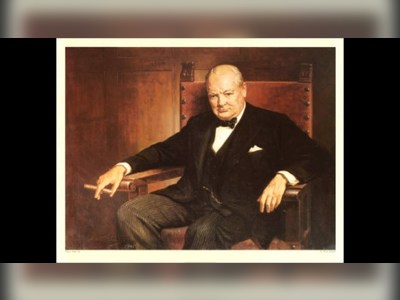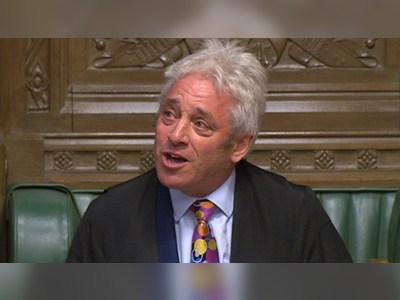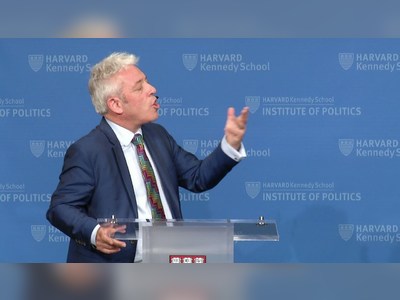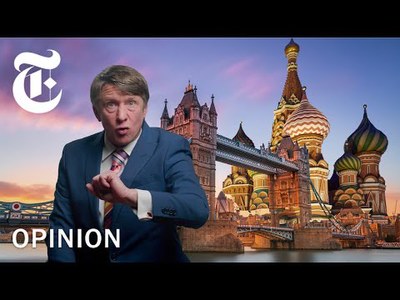British Heritage
Remember, Cherish, Learn.
beta
Winston Churchill's Iron Curtain Speech, 1946
An Enduring Legacy to British Heritage and the World.
Winston Churchill's Iron Curtain speech, delivered in 1946, reverberates in the annals of history as a clarion call to vigilance, unity, and shared responsibility that transcended geopolitical boundaries. More than a mere rhetorical milestone, it is widely perceived as a pivotal moment in the emergence of the Cold War and continues to echo as a significant contribution to British heritage and global history. It captured the essence of the geopolitical reality of its time and helped shape the course of international relations in the post-World War II era.
Delivered on March 5, 1946, at Westminster College in Fulton, Missouri, the Iron Curtain speech has etched an indelible mark on British heritage, underlining Britain's role as a bulwark against threats to global peace and stability. The speech saw Churchill, a former British Prime Minister, convey his profound concern about the rising menace of Soviet communism. By asserting an "iron curtain" had descended across Europe, he encapsulated the ideological and physical divide that the USSR had established between itself, its satellite states, and the noncommunist world.
Churchill's use of the term "iron curtain," while not new, brought a sense of immediacy and gravity to the post-war situation. This metaphorical phrase, coined in the 19th century, had found new relevance in the context of post-War Europe. The Iron Curtain speech amplified this metaphor globally, making it synonymous with the Soviet Union's expansionist policies and the oppressive isolation it imposed on Eastern and Central European countries.
At the heart of this pivotal discourse lay Churchill's far-sighted recognition of the geopolitical ambitions of the Soviet Union. Even before the smoke had cleared from the ruins of World War II, Churchill had anticipated the enveloping influence of the USSR over Eastern Europe. This was at a time when the Western world was still deliberating on the best approach to engage with the Soviet Union, their recent ally turned potential adversary.
Churchill's speech was instrumental in steering the global narrative towards acknowledging the onset of the Cold War (1946-1991). It provided the West with a blueprint for understanding Soviet motivations and actions. As a prescient warning of the escalating tensions between the West and the USSR, the Iron Curtain speech served as a catalyst, influencing Western leaders and the strategies they adopted in the years that followed.
American diplomat George Kennan was one of those influenced by Churchill's stance. His formulation of the "containment" policy, aimed at restricting Soviet influence, resonated with the sentiments conveyed in Churchill's speech. The Iron Curtain speech and Kennan's policy became twin pillars of the West's approach to the Cold War, emphasizing determined resistance rather than appeasement.
Another enduring legacy of Churchill's Iron Curtain speech was his call for a "fraternal association" between the United States and the British Commonwealth. He argued that their unified efforts were essential in countering the Soviet Union's expansionist ambition in the unfolding Cold War era. The necessity of shared military strategies, exchange of officers, and the harmonization of weapons and instructions were all stressed upon, reflecting his belief in a hyper-connected relationship between the two powerhouses.
Churchill, with his remarkable foresight, also accentuated the importance of European integration. In his perspective, the safety of the world required a unified Europe from which no nation should be permanently excluded. This vision foreshadowed the subsequent cooperation that eventually led to the establishment of the European Union, thereby further highlighting the long-term significance of his Iron Curtain speech.
Winston Churchill's Iron Curtain speech has been eternally preserved at Westminster College itself. To commemorate this historic event, the college moved and restored the church of St. Mary the Virgin, Aldermanbury, which was designed by Sir Christopher Wren in the 17th century and damaged during World War II. This serves as a constant reminder of Churchill's immense contribution to global politics and Britain's lasting influence on the world stage.
Winston Churchill's Iron Curtain speech is more than a mere artifact of British heritage—it is a resonant narrative of the post-World War II geopolitical scenario. Its profound influence on shaping Western policy towards the Cold War, promoting greater international cooperation, and defining the contours of global politics in the latter half of the 20th century, affirm its significance in global history. Churchill's insight, courage, and unwavering commitment to freedom continue to inspire and guide the world, encapsulating his enduring contribution to the British heritage and the world.
A Momentous Contribution to British Heritage and Global Political Landscape
Delivered on March 5, 1946, at Westminster College in Fulton, Missouri, the Iron Curtain speech has etched an indelible mark on British heritage, underlining Britain's role as a bulwark against threats to global peace and stability. The speech saw Churchill, a former British Prime Minister, convey his profound concern about the rising menace of Soviet communism. By asserting an "iron curtain" had descended across Europe, he encapsulated the ideological and physical divide that the USSR had established between itself, its satellite states, and the noncommunist world.
Churchill's use of the term "iron curtain," while not new, brought a sense of immediacy and gravity to the post-war situation. This metaphorical phrase, coined in the 19th century, had found new relevance in the context of post-War Europe. The Iron Curtain speech amplified this metaphor globally, making it synonymous with the Soviet Union's expansionist policies and the oppressive isolation it imposed on Eastern and Central European countries.
Recognizing the Emerging Cold War: Churchill's Foresight
At the heart of this pivotal discourse lay Churchill's far-sighted recognition of the geopolitical ambitions of the Soviet Union. Even before the smoke had cleared from the ruins of World War II, Churchill had anticipated the enveloping influence of the USSR over Eastern Europe. This was at a time when the Western world was still deliberating on the best approach to engage with the Soviet Union, their recent ally turned potential adversary.
Churchill's speech was instrumental in steering the global narrative towards acknowledging the onset of the Cold War (1946-1991). It provided the West with a blueprint for understanding Soviet motivations and actions. As a prescient warning of the escalating tensions between the West and the USSR, the Iron Curtain speech served as a catalyst, influencing Western leaders and the strategies they adopted in the years that followed.
American diplomat George Kennan was one of those influenced by Churchill's stance. His formulation of the "containment" policy, aimed at restricting Soviet influence, resonated with the sentiments conveyed in Churchill's speech. The Iron Curtain speech and Kennan's policy became twin pillars of the West's approach to the Cold War, emphasizing determined resistance rather than appeasement.
Proposing a "Fraternal Association" and Greater European Integration
Another enduring legacy of Churchill's Iron Curtain speech was his call for a "fraternal association" between the United States and the British Commonwealth. He argued that their unified efforts were essential in countering the Soviet Union's expansionist ambition in the unfolding Cold War era. The necessity of shared military strategies, exchange of officers, and the harmonization of weapons and instructions were all stressed upon, reflecting his belief in a hyper-connected relationship between the two powerhouses.
Churchill, with his remarkable foresight, also accentuated the importance of European integration. In his perspective, the safety of the world required a unified Europe from which no nation should be permanently excluded. This vision foreshadowed the subsequent cooperation that eventually led to the establishment of the European Union, thereby further highlighting the long-term significance of his Iron Curtain speech.
Memorializing the Iron Curtain Speech
Winston Churchill's Iron Curtain speech has been eternally preserved at Westminster College itself. To commemorate this historic event, the college moved and restored the church of St. Mary the Virgin, Aldermanbury, which was designed by Sir Christopher Wren in the 17th century and damaged during World War II. This serves as a constant reminder of Churchill's immense contribution to global politics and Britain's lasting influence on the world stage.
Conclusion: The Enduring Legacy
Winston Churchill's Iron Curtain speech is more than a mere artifact of British heritage—it is a resonant narrative of the post-World War II geopolitical scenario. Its profound influence on shaping Western policy towards the Cold War, promoting greater international cooperation, and defining the contours of global politics in the latter half of the 20th century, affirm its significance in global history. Churchill's insight, courage, and unwavering commitment to freedom continue to inspire and guide the world, encapsulating his enduring contribution to the British heritage and the world.




